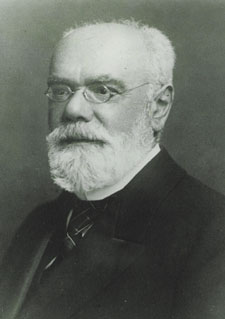Friedrich Veit: Against a Völkisch Religion
Church President Friedrich Veit (1861–1948) shaped the Evangelical Lutheran Church in Bavaria considerably during the Weimar Republic. Appointed to the church government in 1915, Veit succeeded Hermann Bezzel (1861-1917) as president of the church government in 1917. He was installed in the newly created office of church president in January of 1921.
The end of state churchdom in 1918, confronted Veit with the task of adapting the Bavarian regional church to changed political conditions and rebuilding its relationship with the state. He was instrumental in creating the church constitution of 1920 and the agreement between church and state of 1924. What is more, he presided over the German Evangelical Church Federation and was involved in international ecumenical associations.
Politically, Veit initially held monarchist views. He considered the Revolution of 1918 to be suicidal madness aimed at God’s order (quoted from K. Nowak, Kirche, 39). During the Weimar Republic, however, he evolved into a liberal national conservative “pragmatic republican”, who initially sympathized with the German National People’s Party and later with the Christian Social People’s Service (B. Mensing, Pfarrer, 125).
He viewed nascent National Socialism with growing concern. He already warned of the excesses of overheated nationalism after the failed Beer Hall Putsch of November 9, 1923 (letter of November 12, 1923 to the regional consistory, quoted in: B. Mensing, Pfarrer, 78). That same year, he also urged Helmuth Johnsen (1891-1947), a pastor in Coburg who agitated for a right-wing paramilitary organization, to exercise restraint.
As more and more Bavarian pastors became publicly committed to the NSDAP in the final phase of the Weimar Republic, Veit repeatedly urged them to hold back from partisan politics but with hardly any effect. In 1931, he was defamed by the malicious anti-Semitic tabloid “Der Stürmer” after having made the following remarks in a lecture delivered before the Association of Protestant Tradesmen Munich:
The völkisch movement also constitutes an object of serious concern for anyone who takes the Christian belief in revelation seriously. No one wants to listen humbly to the Gospel’s message any longer; rather, they want to mold something like a new religion from the depths of their own soul, which they still call Christianity but is no longer Christianity. (quoted in W. Sommer, Veit, 92f.)
Veit opposed a völkisch religion even more clearly in a lecture in spring of 1932: Here looms the dreadful danger of the völkisch movement, … that it in fact would like to make the nation and ethnic peoplehood the ultimate, indeed the sole value. In contrast to making nation, ethnic peoplehoodand race an absolute, Jesus, however, leads to the realization that God reveals himself to all nations and that his Gospel applies to all nations. (quoted in W. Sommer, Veit, 94).
Following the Nazi seizure of power in January of 1933, Veit refrained from welcoming the new political circumstances in a statement from the church. In March of 1933, he exclaimed at a theological seminary in Munich: I can’t see another Brownshirt! (B. Mensing, Braunhemd). Given his obvious opposition to National Socialism, large circles of the largely euphoric Bavarian regional church felt they could no longer tolerate him. In April of 1933, Veit was urged to resign from church government bodies.
Source / title
- © Landeskirchliches Archiv Nürnberg, Bildersammlung Personen, Veit Friedrich, P6-001

